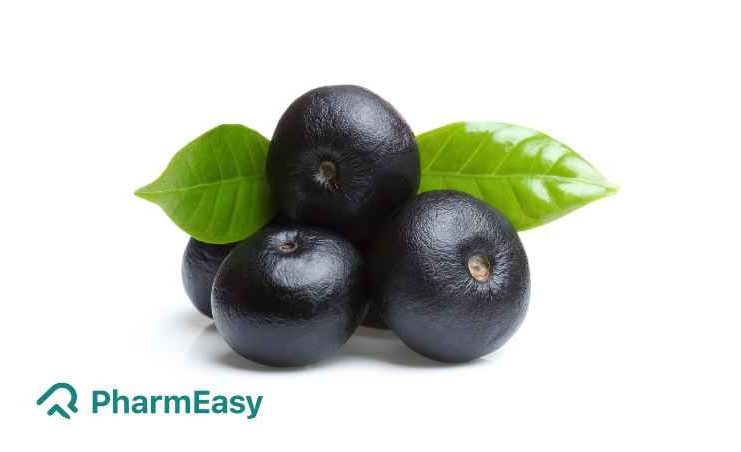Acai Berry: Uses, Benefits, Side Effects and More By Dr. Smita Barode
By Dr Smita Barode +2 more

Get,

to manage your symptom
Get your,


4 Cr+ families
benefitted

OTP sent to 9988776655



You’ve successfully subscribed to receive
doctor-approved tips on
Whatsapp

Get ready to feel your best.

Hi There,
Download the PharmEasy App now!!


Register to Avail the Offer
Send OTPBy continuing, you agree with our Privacy Policy and Terms and Conditions

Hi There,
Sign up on PharmEasy now!!
Trusted by 4 crore+ families

OTP sent to 9988776655



You have unlocked 25% off on medicines




Code: NU25
By Dr Smita Barode +2 more
Table of Contents
“Let food be your first medicine and kitchen be your first pharmacy”. This saying acknowledges the importance of eating healthy and using fruits and vegetables for their health benefits. One fruit that has gained limelight due to its health benefits is the Acai berry. It is a small round berry (usually the size of a grape) obtained from the Acai palm Euterpe oleracea Martius. It is green when immature and ripens to a dark purple colour. This plant is native to south and Central America. In India, it is called ‘kallaa pazham’ and its cultivation is limited to Kerala. Mostly in other parts of India, freeze-dried powder or purées are available. Let us know more about the health benefits of this super berry1.
Acai berries are packed with the goodness of dietary fibres, proteins and minerals like potassium, calcium etc. They are rich in fatty acids, especially palmitic, oleic and linoleic acid. The phytochemicals in Acai berries include anthocyanins and proanthocyanidins. The nutritional Value of Acai berry is given below.

Acai berry shows numerous scientifically proven properties; some of which are mentioned below3:
Based on some research10, the consumption of acai berries might help improve cognitive function in patients suffering from dementia.
Dr. Siddharth Gupta, B.A.M.S, M.D (Ayu)
Some of the potential benefits of Acai berries are described below.

Non-alcoholic fatty liver disease (NAFLD) is one of the most predominant liver diseases worldwide. Phenolic compounds, especially those belonging to the anthocyanin class, may help manage NAFLD. Pirrozi et al. in 2020 conducted a review3 that stated that Acai berry, due to a high content of phenolic compounds, may help reduce fat accumulation in the liver and may potentially benefit NAFLD. However, these results are not proven in any animal or human study and should not be generalised for treating NAFLD in humans.

Over the past few years, the Indian system of medicine has been formulating different extracts from herbs and seeds for managing cancers of the lung, breast, etc. Martinez et al. conducted a study4 in 2018 that showed that extract from Acai berries showed a protective effect against lung cancer. Additionally, phytochemicals like anthocyanins reduce the spread of cancer to other parts of the body. This shows that Acai berries may have the potential to manage lung cancer. However, further research is needed to ascertain these claims as the scientific evidence available is insufficient to claim these results in human beings.

Hypercholesterolemia is elevated blood cholesterol levels and is considered a risk factor for heart disease. Melina et al. conducted a study5 in 2009 showing that Acai berry consumption potentially impacted cholesterol levels in an animal model. These astonishing results show the importance of Acai berry in lowering blood cholesterol and thus, its potential to exert a protective effect on the heart. However, we need human trials to support these claims.

Inflammation is a part of the body’s defence mechanism, which helps remove harmful and foreign substances from the body and helps in the healing process. Ulcerative colitis and Crohn’s disease are two conditions characterised by inflammation of the intestines, which are clinically shown as symptoms like abdominal pain, diarrhoea, fatigue, weight loss, etc. A study6 by Kim et al. in 2011 assessed the potential of Acai berries in intestinal inflammation. The presence of anthocyanins in Acai berries helped in reducing inflammation. Thus, it can be concluded that Acai berries may potentially manage inflammation and can be used to manage intestinal inflammatory diseases. However, we need more scientific evidence to support these claims in humans.

Blood glucose is the main sugar found in the blood and is produced by the breakdown of food that we eat. Udani et al. conducted a study7 in 2011 showing that Acai berry helps reduce blood glucose and improve insulin (a hormone that regulates blood glucose) sensitivity. These astonishing results show the importance of Acai berry in lowering blood glucose levels and thus, its potential to manage diabetes. However, we need human trials to support these claims.

Though there are studies that show the benefits of Acai berry in various conditions, these are insufficient and there is a need for further studies to establish the true extent of the benefits of acai berry on human health.
According to some studies11, acai berry extracts might have some anti-oxidative effects due to the presence of some phenolic compounds, which might be beneficial in oral wound healing.
Dr. Rajeev Singh, BAMS
You must consult a qualified doctor before taking any herbal supplements. Do not discontinue or replace an ongoing treatment of modern medicine with an ayurvedic/herbal preparation without consulting a qualified doctor.
Data from the Natural Medicines comprehensive database from 2020 states that raw Acai berry juice consumption can lead to a disease known as American trypanosomiasis or Chagas disease. This only happens when Acai berry is contaminated with the parasite Trypanosoma cruzi. Chagas disease is characterised by the issues of the heart and digestive system.
However, if you experience any adverse reactions to Acai berries, it is advised to discontinue its intake and immediately contact a doctor or your Ayurvedic physician who has prescribed it. They will be able to guide you appropriately for your symptoms9.
Also Read: 8 Great Benefits of Sapota or Chikoo
Consuming Acai berry is okay if taken in moderate amounts. However, general precautions must be followed in the following conditions:
Also Read: Strawberry: Uses, Benefits, Side Effects By Dr. Smita Barode
However, you must always seek the advice of your Ayurvedic physician about the possible interaction of Acai berry with other drugs and follow the prescription thoroughly, as they will know your health condition and other medications you are taking.
Acai berry is a small round berry (usually the size of a grape) obtained from the Acai palm Euterpe oleracea Martius1.
In the market, Acai berry freeze-dried powder or purées are available1.
In India, Acai berry is called ‘kallaa pazham’.
Yes, Acai berries may help in weight loss5.
The Natural Medicines comprehensive database, 2020 states that raw Acai berry juice consumption can lead to a disease known as American trypanosomiasis or Chagas disease. This only happens when Acai berry is contaminated with a parasite Trypanosoma cruzi, Chagas disease is characterised by heart and digestive issues9.
Disclaimer: The information provided here is for educational/awareness purposes only and is not intended to be a substitute for medical treatment by a healthcare professional and should not be relied upon to diagnose or treat any medical condition. The reader should consult a registered medical practitioner to determine the appropriateness of the information and before consuming any medication. PharmEasy does not provide any guarantee or warranty (express or implied) regarding the accuracy, adequacy, completeness, legality, reliability or usefulness of the information; and disclaims any liability arising thereof.
Links and product recommendations in the information provided here are advertisements of third-party products available on the website. PharmEasy does not make any representation on the accuracy or suitability of such products/services. Advertisements do not influence the editorial decisions or content. The information in this blog is subject to change without notice. The authors and administrators reserve the right to modify, add, or remove content without notification. It is your responsibility to review this disclaimer regularly for any changes.
Comments

Leave your comment...
You may also like
Comments